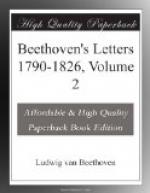It is certainly the duty of every musical composer to become acquainted with all the earlier as well as more modern poets, in order to select what is most suitable to his purpose for songs. Such, however, not being invariably the case, this present collection of Herr v. Kandeler’s cannot fail to be useful and commendable to many who wish to write songs, and also tend to induce more able poets to contribute something in the same direction.
LUDWIG V. BEETHOVEN.—M.P.
I entirely agree with Herr v. Beethoven.
JOS. WEIGEL.
290.
TO THEODORE AMADEUS HOFFMANN.[1]
Vienna, March 23, 1820.
I seize the opportunity through Herr N. of approaching a man so gifted as yourself. You have also written of my humble self, and Herr N.N. showed me some lines of yours about me in his album; I have, therefore, every reason to believe that you feel some interest in me. Permit me to say that, on the part of so talented a man as yourself, this is truly gratifying to me. I wish you all possible good and happiness, and remain,
Sir, with esteem, your obedient
BEETHOVEN.
[Footnote 1: It is well known that Hoffmann, in the years 1809 to 1812, wrote the first really important articles on Beethoven’s works for the Leipzig A.M. Zeitung on his instrumental music, his trios, and masses, &c., &c.]
291.
TO HERR HASLINGER,—ADJUTANTERL.
I request the Adjutant to lend me the score of the Overture in E flat, which I will return as soon as the performance is over. I also beg he will be so good as to send me Kirnberger’s work to supply the place of mine, as I am at this moment giving lessons in counterpoint, and have been unable to find my own manuscript amid my confused mass of papers. Yours,
MI CONTRA FA.
292.
TO TOBIAS,—ADJUTANT.
MOST WORTHY ADJUTANT,—
I have made a bet of ten florins, W.W., against the truth of your having been obliged to pay a compensation of 2000 florins to Artaria for the new edition of Mozart’s works, which have been again and again engraved and sold everywhere. I really wish to know the truth on this subject, for I cannot possibly believe what is said. If it be the fact that you have been so unhandsomely treated, then Ah, dolce contento must pay the ten florins. Send me a true report. Farewell; be a good Christian. Your
BEETHOVEN.
293.
TO THE ARCHDUKE RUDOLPH.
Vienna, April 3, 1820.
YOUR ROYAL HIGHNESS,—




